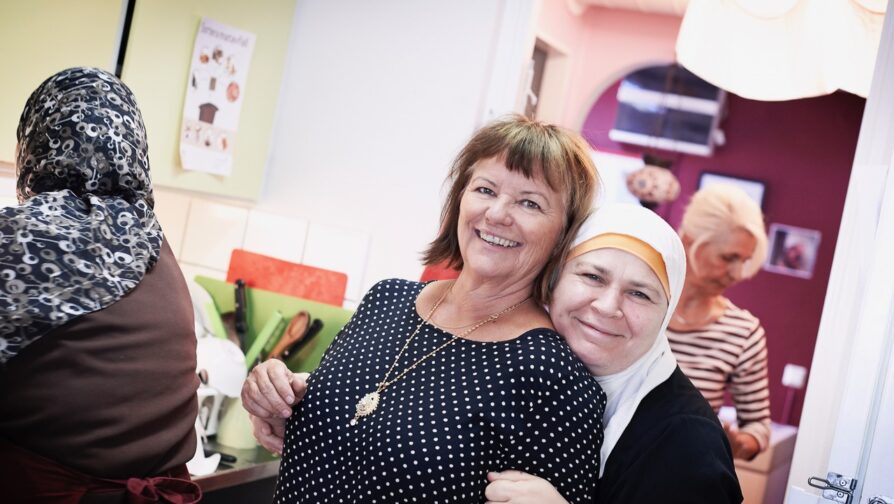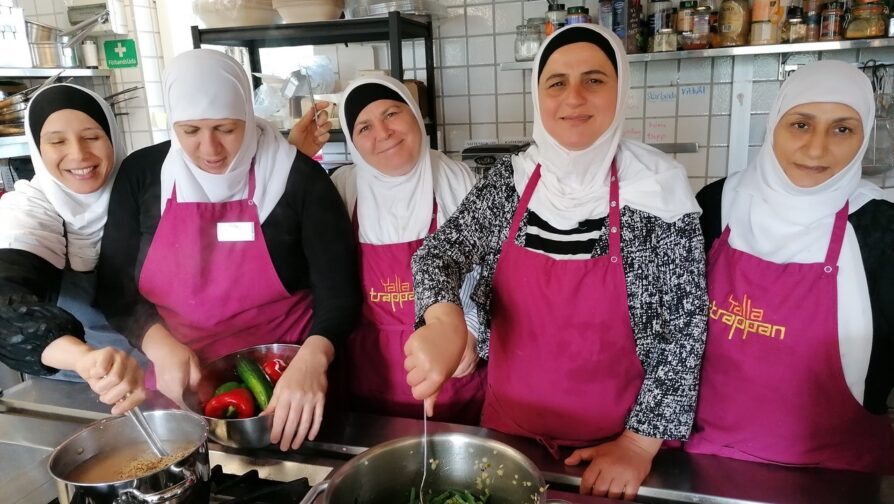© Yalla Trappan/ Gugge Zelander
When Fatme Ibrahim arrived in Sweden on a November night 28 years ago after having fled from Lebanon, she felt very cold and very alone. She arrived with her husband and their young children – and without any formal work experience. Today, Fatme works at Yalla Trappan, a social enterprise and women’s cooperative for social and labour market inclusion, supervising 40 women.
Yalla Trappan was formally established in 2010, after having been run as a temporary project in different forms since 2006. The organization was set up by Christina Merker Siesjö with the aim of creating opportunities for migrant and refugee women to be included in social and professional life in Malmö, Sweden. Building on skills that the women often already have – including cooking, sewing, and cleaning – Yalla Trappan provides a dedicated space and training for these skills to be developed in order for participants to reach a professional standard.
The name Yalla Trappan – where Yalla loosely translates from its original Arabic to an encouraging “come on!”, and trappan is Swedish for “staircase” – was suggested by the women themselves. They wanted to communicate the gradual development that the organization provides, coupled with continuous encouragement along the way.

© Yalla Trappan/ Gugge Zelander
Representing over 20 nationalities, a majority of the women have a refugee background. Over the past years, the employment rate of refugees in Sweden has increased. However, refugee women still have lower employment rates than both foreign-born men and the native-born population.
“Situations like these require proactive and targeted labour market inclusion measures that allow refugee women to develop their self-reliance,” says Karolis Zibas, Integration Officer in the Nordic and Baltic countries for UNHCR, the UN Refugee Agency.
When Yalla Trappan started, migrant and refugee women with limited formal education or work experience were often overlooked in integration initiatives, explains Christina Merker Siesjö. According to her, many of the women who enter into contact with Yalla Trappan have very low self-esteem, have spent long periods of time on sick leave, and feel excluded from society.
“For many of the women, the tradition is to work in the home. To be able to build on those skills, and in turn develop a professional identity, is a very big step,” Christina Merker Siesjö explains.
“We have sometimes been criticized for focusing on work that is traditionally prescribed to women,” Christina says, explaining her philosophy as follows: “If a woman has two years of education, it is not reasonable to expect her to become a pilot. You need to build a platform from where the woman is currently standing.”

Founder Christina Merker Siesjö together with one of the women who work at Yalla Trappan. © Yalla Trappan/ Urzula Striner
Most women arrive at Yalla Trappan through a referral from the Swedish Public Employment Office. They are then offered a six-month internship in one of Yalla Trappan’s three main services – café and catering, the sewing workshop, and cleaning services – and are supported to find employment. During the internship, the women receive Swedish language and job skills training and are supervised by women, such as Fatme, who are experienced in their field of work and who once started in the same position.
As a supervisor, Fatme sees newly arrived women go through the same professional and personal development as she did when she started with the organization ten years ago.
“Before Yalla Trappan, I was at home, feeling bored and depressed,” she says.
Through her internship and, later, employment at Yalla Trappan, however, Fatme had the opportunity to use her cooking skills from home to cook at Yalla Trappan’s catering service.
“When I work at Yalla Trappan, I feel much happier, and interacting with customers makes me feel like I am part of society,” Fatme says. “The women are like a family, and Yalla Trappan has become my second home.”

© Yalla Trappan/ Gugge Zelander
After the six-month internship, the women either move on to employment with Yalla Trappan or with one of their partners or pursue further studies. Approximately 100 women take part in the internships each year.
“Having your own income is essentially a question of freedom. In my opinion, economic independence is fundamental for gender equality,” says Christina Merker Siesjö.
The organization’s efforts have been recognized both nationally and internationally through several prestigious awards. In February 2021, Yalla Trappan was awarded both the Swedish Equality Award and the European Parliament’s European Citizens’ Prize.
Yalla Trappan has developed close partnerships with municipalities and other public bodies, as well as with the private sector through companies including IKEA, H&M and Skanska. The organization has also published three books and run workshops to share knowledge and experience with other organizations, municipalities, and the private sector. Inspired by Yalla Trappan, local independent Yalla initiatives have sprung up all across Sweden.
“We are very happy to see that Yalla Trappan is addressing the specific needs and vulnerabilities of refugee women. The organization’s approach of developing partnerships with integration authorities creates sustainable solutions for refugee labour market inclusion and provides a great example for Sweden and elsewhere,” says Karolis Zibas, Integration Officer with UNHCR’s Representation for the Nordic and Baltic Countries.
Share on Facebook Share on Twitter